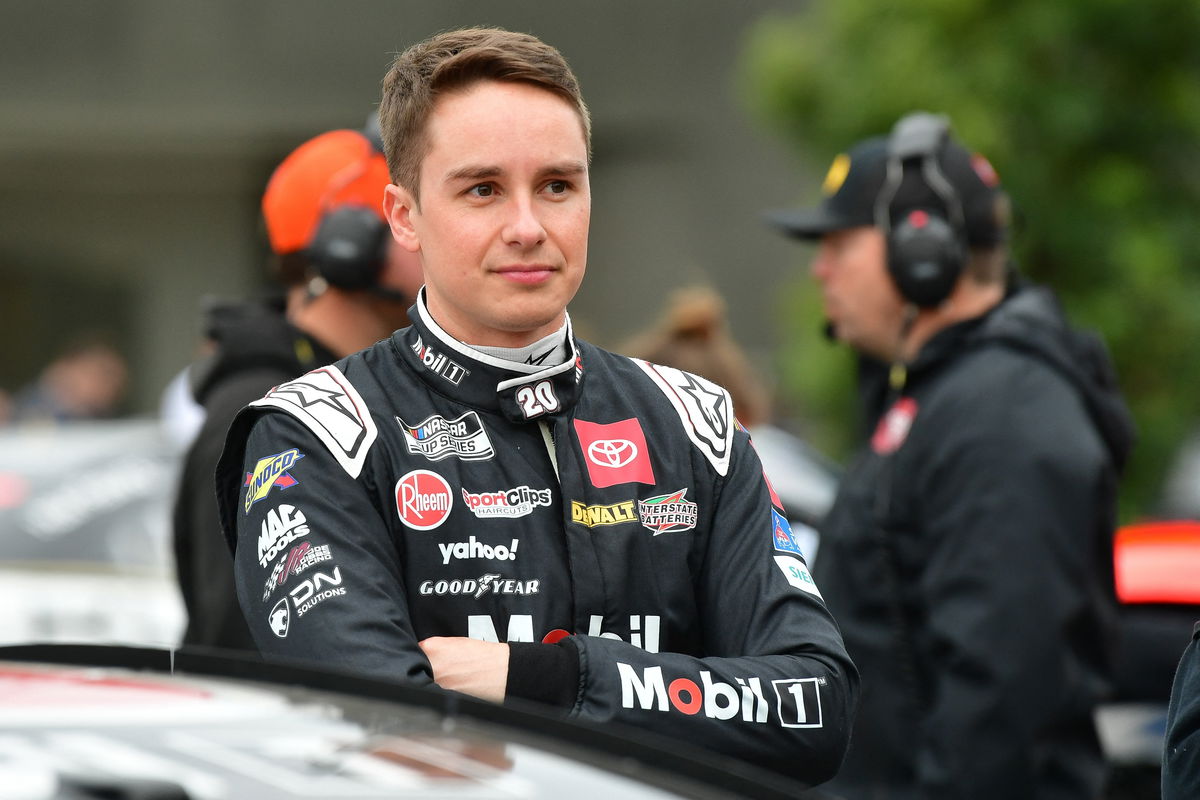
USA Today via Reuters
Feb 3, 2024; Los Angeles, California, USA; NASCAR Cup Series driver Christopher Bell (20) during practice at Los Angeles Memorial Coliseum. Mandatory Credit: Gary A. Vasquez-USA TODAY Sports

USA Today via Reuters
Feb 3, 2024; Los Angeles, California, USA; NASCAR Cup Series driver Christopher Bell (20) during practice at Los Angeles Memorial Coliseum. Mandatory Credit: Gary A. Vasquez-USA TODAY Sports
During overtime at the Brickyard 400 in Indianapolis, Christopher Bell’s #20 bumped Zane Smith’s #38, triggering a dramatic reaction. The unfortunate incident happened after Turn 4 on Lap 162. Bell was right behind Smith, and his car hit the right-rear end of Smith’s, sending the latter into the wall.
Watch What’s Trending Now!
Given NASCAR’s recent penalties for intentional wrecks, such as Austin Hill’s Xfinity Series penalty earlier this season, which drew harsh backlash and disciplinary action, many anticipated that Bell, too, would face a similar penalty. The incident echoed high-profile right-hook moments that previously cost drivers dearly.
Christopher Bell is known for hard but measured racing. He’s never built a reputation as a vendetta-driven driver. Unlike Austin Hill, whose recent on‑track confrontations led to suspension, Bell has maintained a clean record. That history likely influenced NASCAR’s interpretation of his move during the Brickyard showdown.
Motorsports reporter Bob Pockrass recently confirmed via X that NASCAR reviewed the wreck and ruled the incident an “aggressive, but mistimed” racing move not a retaliatory action. And that is why no penalty will be issued. The decision underscored NASCAR’s emphasis on intent: if it’s not calculated retaliation, it doesn’t meet the threshold for punishment.
For those asking about Christopher Bell and his contact with Zane Smith: That incident was reviewed and NASCAR viewed it as an aggressive, but mistimed, racing move by Bell and not a move of retaliation that rose to the level of a penalty.
— Bob Pockrass (@bobpockrass) July 30, 2025
This incident follows a growing list of contentious finishes where the line between aggressive racing and intentional retaliation is blurry. From past skirmishes featuring Joey Logano or Ross Chastain, NASCAR has repeatedly turned to context and precedent when ruling. Bell’s situation adds another chapter where history and intent outweigh pure impact. And now, the fans also chimed in to side on NASCAR’s decision on this matter.
Fans applaud NASCAR’s call on Bell’s act
NASCAR’s decision not to penalize Christopher Bell drew widespread agreement from fans who saw the move as a moment of clarity in a sport often criticized for inconsistency. “A completely obvious decision. Fans complaining for a suspension are delusional,” one fan wrote, capturing a dominant sentiment across platforms. The lack of prior drama between Bell and Smith helped solidify that stance. Viewers simply didn’t believe the contact rose to the level of a punishable offense.
Another fan cut straight to the heart of the matter: “Correct decision too. Very clear difference between what Hill did and what Bell did. You don’t suspend people for accidents, only for ill intent.” This echoed a popular comparison to Austin Hill’s recent suspension, which involved brake bias manipulation and clear retaliation. Bell’s actions, on the other hand, didn’t show that kind of premeditation, just a racing incident with unfortunate timing.
Also, it wasn’t just about the contact; it was about the context, or in this case, the lack of it. “Spot on, it did not look intentional. Also, it would take a good bit of past history for that to even go through his mind, I’m sure.” With no feud, no heated moments leading up to it, and no track record of bad blood, the idea that Bell’s move was calculated just didn’t stick.
Fans also gave credit where it was rarely due. “W decision by NASCAR icl,” one said. Another chimed in, “Very rare and uncommon NASCAR W.” In a landscape where officiating is constantly under fire, these nods of approval meant something. It showed that when decisions feel measured and motive-based, NASCAR earns back the necessary trust.
“Not even sure what people think that was retaliation for, pretty sure they had no prior incidents,” added another fan, brushing off any notion of vengeance. That’s where many landed: no history, no motive, no punishment needed. For these fans, NASCAR didn’t just get it right, they followed their own rulebook, and for once, it actually showed.
NASCAR’s ruling on Christopher Bell illustrates a delicate balance: recognizing aggressive moves while honoring context and driver history. By declaring Bell’s contact as misguided rather than malicious, NASCAR leaned into intent‑based discipline, much to the approval of a majority of fans. Critics may still argue for zero tolerance on contact, but in this case, most agree with the sport’s decision.



